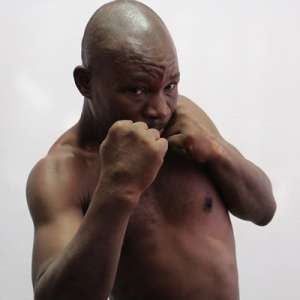 Kweku Abraham aloas Adanko Deka
Kweku Abraham aloas Adanko Deka
The stitches over his left eye is still visible despite years of healing time. His knuckles are marked by lines and patches of discolouration. He made headlines in the 1980’s as a champion boxer earning every one of these scars.
And after many years, Kweku Abraham now wants to be back in the ring. I've heard rumours of him hanging around Adabraka in Accra drinking in a local bar, telling tales of his past glory.
As a boy, I remember crowding into a busy tailor’s shop in Korle-Bu to watch highlights of his reel. To me, he was one of Ghana's brightest black stars. Maybe it was his name, Adanko De Ka, which grabbed me or watching him earn that name with his agile fighting style. Either way, he was s as swift as a rabbit, and made his opponents look foolish.
A few months ago, I left messages at his usual hangout joints of my intention of meeting him and almost gave up until he recently showed up in my office. Without any introduction, I knew right away it was Adanko De Ka. Beaming with smiles he shook my hand and sat back in his seat.
He was shorter than he seemed when I was a child. He wore an ill-fitting shirt and trousers, but they couldn’t hide the powerful build of his frame. I realised much had transpired since the fights I watched on the television in the tailor’s shop. Still, there in front of me sat my idol; the swift boxer I had cheered to victory so many times in my youth.
I learnt he wasn’t much older than me when he fought in those bouts. The son of a fisherman, he worked the boats at a very young age but the rim always called to him.
“I watched people box and I thought I could beat them, even as a small boy,” he said. By eight years old, he was already fighting. A professional by 12, he took every fight available. “I’d fight four times a month, sometimes. Every weekend, fighting I was a featherweight but I stopped many opponents bigger than that.”
He told me he wants to return to the sport that made him famous and expressed his desire to make a comeback. He said he quit because he had no one left to fight, saying, “I wanted people to fight me but they were all scared of me.”
As the conversation progressed he recalled how he was robbed during a fight and when he demanded for a rematch his opponent kept dragging his feet. “My opponent kept coming with excuses when the rematch was arranged. He either said he had a problem with his neck, waist, stomach or leg. I felt I wasn’t getting the opportunities I deserved but all the same I kept training hard.”
Hearing his voice put me back in the tailor’s shop. The television flickering as my friends and I watched him fight champions like Ike “Bazooka” Quartey, a man twice his size. I remember overwhelming excitement when he won the West African Featherweight title. He had knocked his opponent out in the first round, and nearly knocked him out of the ring.
To us, he was the champion of Africa; it was just a matter of time before he was champion of the world. But that never happened. We stopped hearing about his fights. Our champion disappeared.
He’s thirty-five now, close to an age when most boxers retire. His physique looks like he may have a few fights left for him, but it became clear there are other issues at play. His eyes were glassy, bloodshot and only open part-way; all traits indicative of a man who has grown too fond of drink.
According to Abraham, he was never paid what he was promised by promoters and when he made noise they refused to let him fight. He said this was the real reason he left the ring. He said. This revelation shocked me. How could Ghana treat one of its most prized fighting men this way?
“I won all those fights, had my hand raised but I wasn’t able to save money during my career. They robbed me,” he said, reflecting on his career while vowing to remind everyone who Adanko De Ka is. “I wasn’t able to save money during my career and I want to prove to everybody that I am not finished yet. I am calling on Ghanaians to put me back in the ring”.